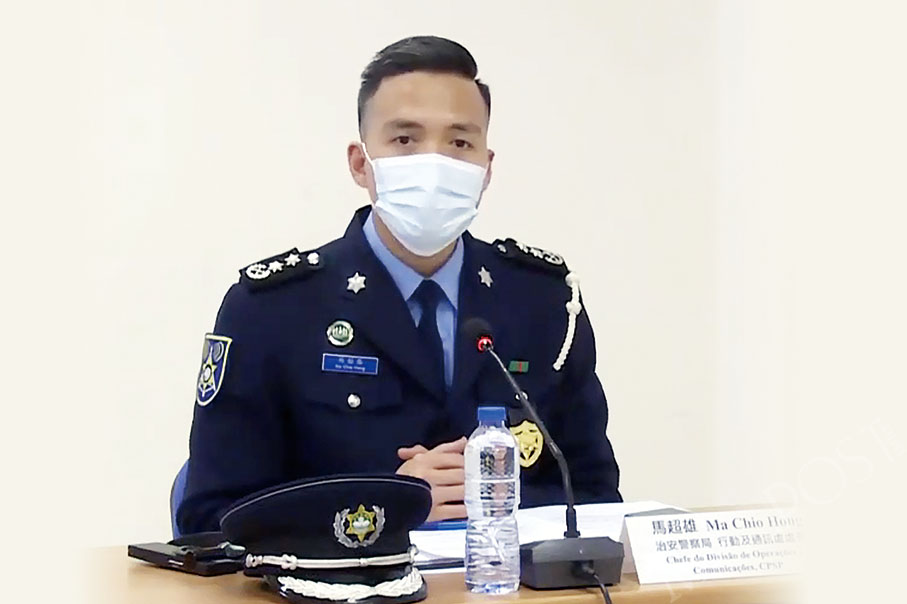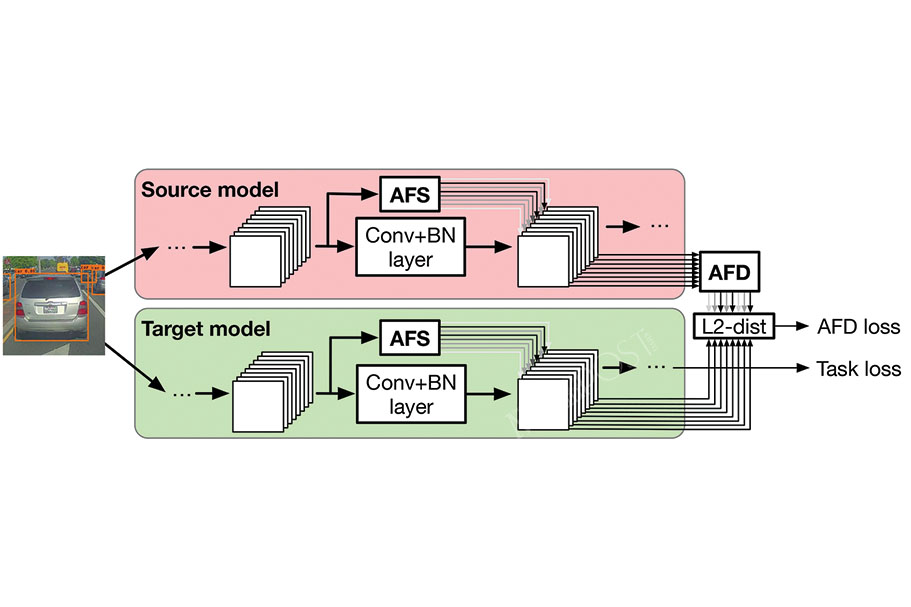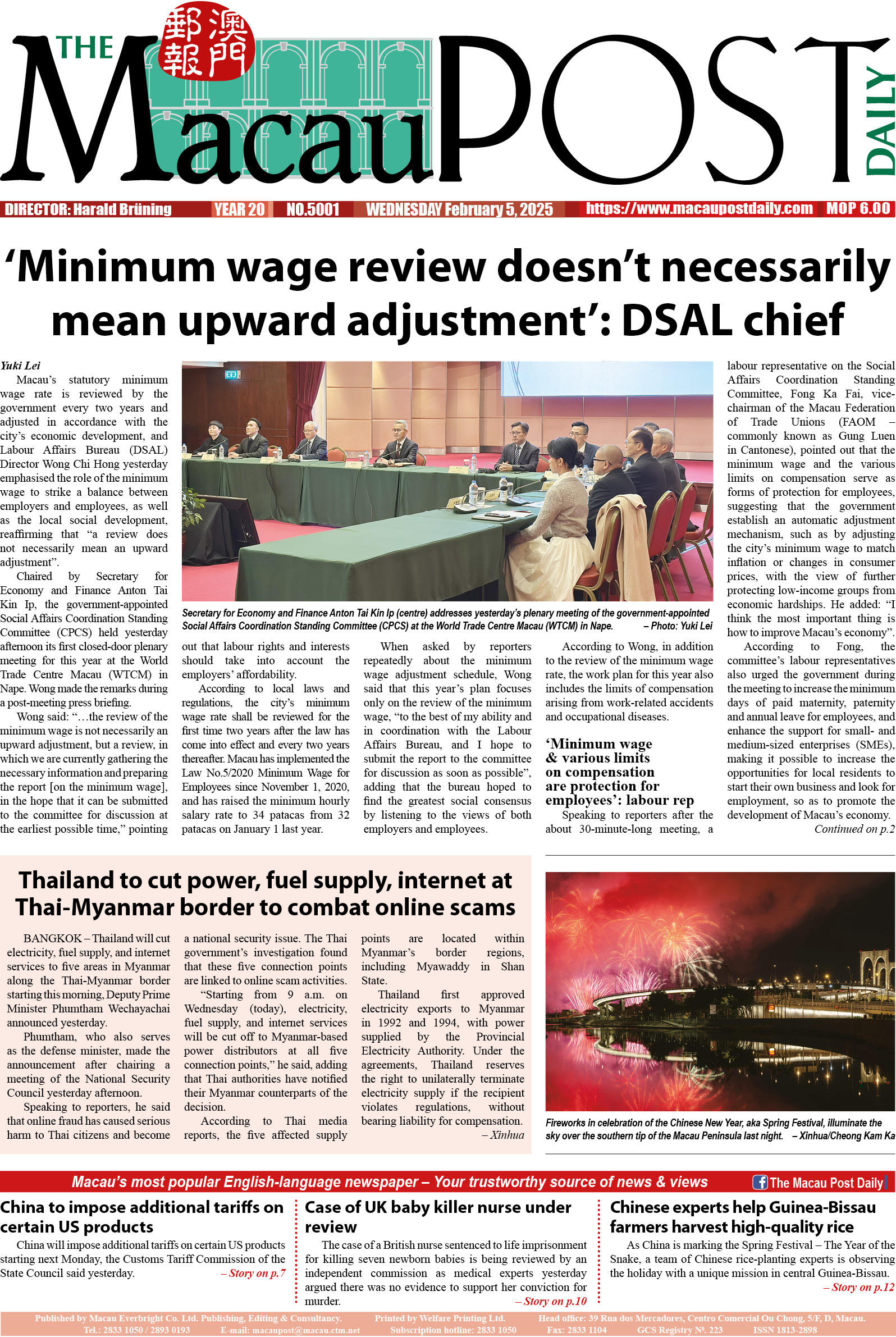The police recorded 2,380 crime cases in the first quarter, a year-on-year drop of 28.4 percent, amidst Macau’s novel coronavirus (COVID-19) epidemic, Ma Chio Hong, who heads the Operations and Communications Division of the Public Security Police (PSP), said during yesterday’s daily press conference about the local COVID-19 situation.
Quoting statistics by the Unitary Police Service (SPU), Ma said that 70 crime cases reported in the first quarter were committed by non-resident workers, down by 11.4 percent year-on-year. The number of reported crime cases committed by non-resident workers accounted for less than three percent (2.9 percent) of the number of all the crime cases recorded during the first three months, Ma said.
Ma announced the provisional January-March crime statistics, when replying to a question by a reporter, who asked whether the COVID-19 epidemic has adversely impacted Macau’s public security.
Ma noted that Macau’s overall public security has been good and in a stable condition since January, adding that the situation in which “no or very few” serious violent crime cases were reported continued in the first quarter of this year. “Consequently, the police do not see any deterioration in [Macau’s] public security,” Ma said.
Ma pointed out that a large number of non-resident workers who live in Zhuhai have been temporarily living in Macau since February 20 when the local government imposed its 14-day quarantine measure on non-resident workers who have been in the mainland within the 14 days prior to their intended entry into Macau. The quarantine measure carried out in collaboration with the Zhuhai government is still in force.
Ma admitted that the situation could potentially have an adverse impact on public security and fire safety in the community and possibly create strife between local residents and non-resident workers in the community, adding that consequently the police have formulated a plan to be ready for any eventuality. Since then, the police have strengthened patrols in the community and intelligence gathering concerning the possible occurrence of criminal and other illegal activities.
Ma said that in addition, the police have maintained close communication with employment agencies hiring non-resident workers, and the two sides have been working together to strengthen crime prevention and security awareness campaigns among non-resident workers employed in Macau.
Since February 20, non-resident workers who have been in the mainland within the 14 days prior to their intended entry into Macau have to go into quarantine and medical observation for 14 days at a facility in the adjacent city of Zhuhai arranged by the health authorities there and then obtain a health certificate issued by the Zhuhai health authorities confirming that they have not been infected with the novel coronavirus disease, before they are allowed to enter Macau.
In order to avoid the 14 days of quarantine, a large number of non-resident workers who live in Zhuhai moved to Macau to temporarily live here before the implementation of the measure in February, according to local media reports.
Foreign visitors have been barred from entering Macau since March 18, and the entry ban was extended to cover all foreign nationals – including foreign non-resident workers – on the following day.
Mainland, Hong Kong and Taiwan residents who have been to a foreign country within the past 14 days have been barred from entering Macau since March 25.
Ma Chio Hong, who heads the Public Security Police’s (PSP) Operations and Communications Division, addresses yesterday’s press conference at the Health Bureau (SSM) about the city’s novel coronavirus (COVID-19) situation. Photo: GCS
According to data from the Macau Labour Affairs Bureau (DSAL), at the end of February the number of non-resident workers stood at 191,377. Foreign nationals (mostly Filipinos, Vietnamese, Indonesians, Nepalese and Myanmarese) accounted for 36 percent of the total number. Compatriots from the Chinese mainland (116,500), Hong Kong (4,530) and Taiwan (1,671) accounted for the remaining 64 percent.
Ma said that the provisional January-March crime statistics show that the mandatory quarantine measure that has been imposed since February 20 on non-resident workers has not resulted in a large increase in crime cases in Macau. Ma noted that local residents have been paying close attention to the three crime cases which were committed by non-resident workers last week, insisting that the three cases were isolated cases. Ma pointed out that the police have solved the three cases and transferred the three suspects – two non-resident workers from the mainland and one from Vietnam – to the Public Prosecution Office (MP) for further investigation. The police are capable of ensuring Macau’s good public security, Ma said.
Treasure Hotel no longer a ‘quarantine hotel’
Meanwhile, Inês Chan Lou, who heads the Licensing and Inspection Department of the Macau Government Tourism Office (MGTO), announced during yesterday’s press conference that the 400-room Treasure Hotel in Taipa, one of the government’s “quarantine hotels”, will return to its normal hospitality role, following disinfection and cleaning.
The government announced earlier this week that after disinfection and cleaning, the 112-room Metropole Hotel in the city centre and the 326-room Regency Art Hotel in Taipa will resume their normal hotel service following their role as designated hotels for quarantine and medical observation purposes.
Regency Art Hotel, Metropole Hotel and Treasure Hotel became the government’s third, fifth and sixth “quarantine hotels” between March 19 and 21.
Following the completion of the three hotels’ role as “quarantine hotels”, Macau still has nine designated hotels for quarantine and medical observation purposes, with a total of about 2,200 rooms.
Chan also said that as of yesterday afternoon 1,469 people were still undergoing their 14 days of quarantine and medical observation in the government’s now nine “quarantine hotels” – comprising 1,208 Macau residents, 205 non-resident workers and 56 visitors.
Home quarantine is no longer practised in Macau.
Meanwhile, Alvis Lo Iek Long, a clinical director of the public Conde de São Januário Hospital Centre, said during yesterday’s press conference that the condition of Macau’s 18th patient, the only case which has been classified as “serious”, was further improving. Lo said that the patient, a 50-year-old local woman who had returned to Macau from New York with three children, now is less dependent on a ventilator, adding that her pneumonia has become less serious.
Macau has so far confirmed 44 COVID-19 cases. Macau’s 10 “first wave” patients – comprising seven tourists from Wuhan and three locals – have been discharged. All the 34 patients in the “second wave” – which began on March 15 – are still undergoing treatment. All the 34 cases in the current “second wave” have been classified as imported, most of them local students returning from overseas. The 44th case was confirmed on Sunday.
Macau’s “first wave” of the COVID-19 infection lasted from January 22 to February 4.
Lo also pointed out that the first COVID-19 patient in the “second wave” – Macau’s 11th COVID-19 patient – has been undergoing treatment at the public hospital for over three weeks, adding he expected the patient – an Air Macau flight attendant from South Korea – to meet the official standards for discharge later this week. Lo noted that the government will announce her discharge on the day that it takes place.






